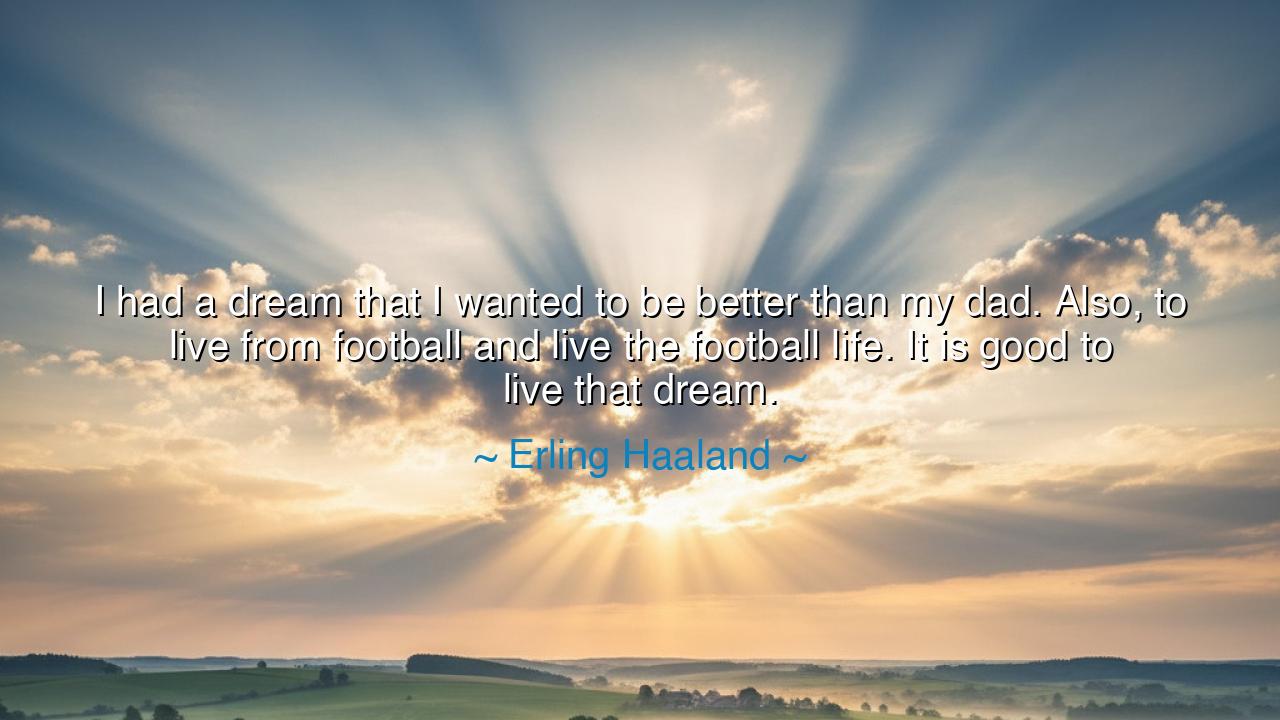
I had a dream that I wanted to be better than my dad. Also, to
I had a dream that I wanted to be better than my dad. Also, to live from football and live the football life. It is good to live that dream.






“I had a dream that I wanted to be better than my dad. Also, to live from football and live the football life. It is good to live that dream.” — Erling Haaland
In these earnest and powerful words, Erling Haaland, the young warrior of the modern football fields, reveals a truth as ancient as ambition itself — the sacred bond between dream and destiny, between father and son, between the call to surpass one’s origins and the gratitude of living one’s purpose. His voice, though born in our age, speaks the timeless language of aspiration. He honors his father by striving beyond him, not in rivalry, but in reverence — for every great son is both the continuation and transcendence of his lineage.
The first flame in Haaland’s heart was lit by his father, Alf-Inge Haaland, a man who once walked the same grassy battlefields of sport. The son watched, learned, and dreamed — as all sons do — to take what was given and to raise it higher. “I wanted to be better than my dad,” he says, not as boast, but as a vow to evolution, a recognition of the duty each generation owes the one before. In those words lies a profound teaching: that to honor one’s ancestors is to build upon their foundations, to carry their work beyond the horizon they could reach.
This pattern is as old as civilization itself. When Alexander the Great conquered the known world, he did so with the shadow of his father, Philip of Macedon, behind him — the builder of the army that would make his glory possible. Yet Alexander’s greatness did not erase his father’s; it completed it. The dream of the father became the achievement of the son, and thus both names were woven into eternity. So too does Haaland, in his own age and craft, live this timeless dance between inheritance and individuality — between gratitude for what was given and the courage to go beyond.
The second part of his reflection — “to live from football and live the football life” — speaks to the fulfillment of vocation. It is not only to play the game, but to become one with it; to breathe its rhythm, to let its discipline shape the soul. This is what the ancients called areté — the excellence of living one’s nature fully, of becoming what one was born to be. Haaland does not dream of wealth or fame, but of alignment, of living wholly within his calling. “It is good to live that dream,” he says — a simple sentence, yet radiant with contentment. Few things are more divine than to live inside one’s purpose and to feel that the dream of childhood has become the life of manhood.
And yet, Haaland’s words also carry the quiet recognition of struggle. To “live the football life” is to live the life of discipline, pain, and persistence. Behind every victory lie countless unseen hours of effort — the early mornings, the aching muscles, the solitude of training. The dream that he “lives” was not gifted, but forged. The lesson here is ancient: dreams become real not through wish, but through work. Even the greatest fire must be fed daily, or it fades to ash.
Consider Michaelangelo, who once said that if people knew how much work went into his masterpieces, they would not call them genius. Like Haaland, he lived his art; he breathed the dust of creation and gave his life to beauty. His greatness, too, was born of relentless commitment — the same sacred discipline that turns the young dreamer into a legend. This is the eternal truth: that to live a dream is to labor joyfully in its service, to love the work as much as the glory.
So, O seeker of purpose, learn from this: dreams are the inheritance of the brave. Do not envy the man who achieves his dream; rather, learn from his devotion. Begin with gratitude for those who came before you — your mentors, your parents, your teachers — and then dare to rise above them, not in pride, but in tribute. Live your calling so deeply that work and joy become one. Give yourself wholly to the craft that stirs your heart, and when you stand in the field of your own destiny, able to say, as Haaland does, “It is good to live that dream,” you will have found what the ancients called true glory — the peace of a soul that has fulfilled its purpose.






AAdministratorAdministrator
Welcome, honored guests. Please leave a comment, we will respond soon